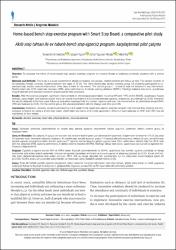| dc.contributor.author | Kundakcı, Yunus Emre | |
| dc.contributor.author | Taşkın, Gülşen | |
| dc.contributor.author | Taşvuran Horata,Emel | |
| dc.contributor.author | Koz, Mitat | |
| dc.date.accessioned | 2023-11-15T08:24:04Z | |
| dc.date.available | 2023-11-15T08:24:04Z | |
| dc.date.issued | 2023 | en_US |
| dc.identifier.citation | KUNDAKCI, Y., Taşkın, G., HORATA, E., & Koz, M. (2023). Home-based bench step exercise program with Smart Step Board: a comparative pilot study. Spor Hekimliği Dergisi, 58(2). | en_US |
| dc.identifier.issn | 2587-1498 | |
| dc.identifier.uri | https://dx.doi.org/10.47447/tjsm.0727 | |
| dc.identifier.uri | https://hdl.handle.net/20.500.12933/1749 | |
| dc.description.abstract | Objectve: To compare the effect of home-based step aerobic exercise program on physical fitness in sedentary university students with a control group. Materals and Methods: This study is a quasi-experimental design comparing two groups, pretest-posttest and follow-up test. The sample consists of 25 sedentary female university students between the ages of 18-25. The home-based step aerobic exercise group (14 students) participated in su pervised step aerobic exercise intervention three days a week for six weeks. The control group (11 students) was not included in any intervention. Resting heart rate (rHR), heart rate recovery (HRR), jump performance, 6-minute walking distance (6MWD), Flamingo balance test score, quadriceps muscle strength and exercise motivation of participants were assessed. Results: After the exercise program, significant improvements in physiological parameters including rHR and HRR, and in 6MWD, quadriceps muscle strength, jump height, and balance scores led to an overall improvement in functional exercise capacity, endurance, and strength (p<0.05). However, the results obtained at the four-week follow-up evaluation displayed that this current improvement was not maintained for all parameters except RHR, HRR and balance (p<0.05). For the control group, the above parameters did not change over time (p>0.05). Conclusons: Sedentary university students participating in a 6-week home-based step aerobic exercise program can improve their physical and phy siological functions by using a smart step board, chest heart rate band, and mobile application. Effects of post-exercise on RHR and HRR may be maintained for four weeks. | en_US |
| dc.language.iso | eng | en_US |
| dc.publisher | TÜRKİYE SPOR HEKİMLERİ DERNEĞİ | en_US |
| dc.relation.isversionof | 10.47447/tjsm.0727 | en_US |
| dc.rights | info:eu-repo/semantics/openAccess | en_US |
| dc.title | Home-based bench step exercise program with Smart Step Board: a comparative pilot study | en_US |
| dc.type | article | en_US |
| dc.authorid | 0000-0002-2006-9940 | en_US |
| dc.department | AFSÜ | en_US |
| dc.contributor.institutionauthor | Kundakcı, Yunus Emre | |
| dc.contributor.institutionauthor | Taşkın, Gülşen | |
| dc.contributor.institutionauthor | Taşvuran Horata, Emel | |
| dc.identifier.volume | 58 | en_US |
| dc.identifier.issue | 2 | en_US |
| dc.identifier.startpage | 74 | en_US |
| dc.identifier.endpage | 81 | en_US |
| dc.relation.journal | Spor Hekimliği Dergisi | en_US |
| dc.relation.publicationcategory | Makale - Ulusal Hakemli Dergi - Kurum Öğretim Elemanı | en_US |
















